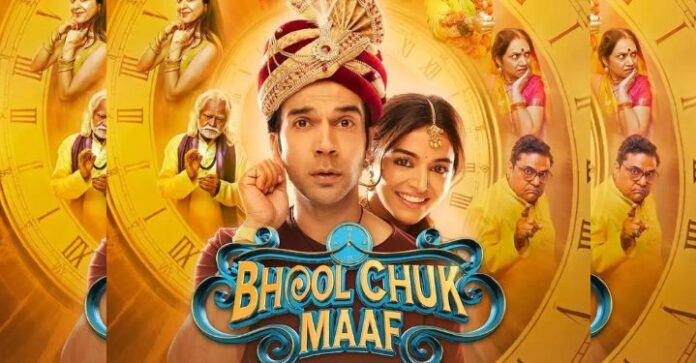Film Rating : ⭐(1/5) Stars
Bhul Chuk Maaf is a disappointing film and a failed to compelling family entertainer. In today’s time, it’s rare to come across movies that blend entertainment with a strong social message, but this one doesn’t it.
Through its unique time-loop, sci-fi comedy setup, it teaches us that life isn’t just about thinking for ourselves. When we start caring for others, it not only makes them happy – it leaves a lasting impact on our own lives. The film subtly reminds us of the age-old wisdom: “Do your karma, don’t worry about the results, even if people don’t like you.”
Rajkummar Rao and Wamiqa Gabbi deliver superb performances. They bring depth and sincerity to their roles, making the emotional moments feel real and the concept relatable. While the comedy isn’t heavy, the film has its light-hearted moments. At times, the pace may feel a bit slow, but it picks up, and by the end, you’ll be surprised that it’s already over.
What should’ve been a story of human struggle or social satire ends up as nothing but a thinly veiled hit job — one that goes out of its way to mock, distort, and vilify Hindu identity, culture, and values.
From the very first frame, the agenda is clear. Hindus are painted with the broadest, most caricatured brush strokes possible: greedy, corrupt, backward, and laughable. The main character — a Hindu — is depicted as a jugadu clown, a man ready to bribe, cheat, and stoop to any level for a job. Even more offensive is the recurring joke about “Bhagwan Das” — the name itself a clear attempt to mock divinity — who conveniently disappears, followed by the repeated dialogue “Bhagwan bhaag gaya, kisi kaam ka nahi.” Subtlety? Nuance? Forget it — the writers go for a sledgehammer approach to blasphemy and cultural insult.
Then comes the Pandit, yet another cartoonish depiction: greedy, exploitative, and utterly devoid of spirituality. This is not a critique of individual hypocrisy — this is a systemic insult hurled at an entire faith. When characters wear symbols of Hinduism, it becomes a costume for ridicule.
And of course, for contrast, we are presented with a Muslim character — Hamid Ansari — the epitome of virtue. Honest, kind, suicidal because of systemic injustice, and portrayed as a near-saint. The difference in treatment is so stark it might as well have been written in neon: Hindu = evil, Muslim = noble. And yes, just to hammer the point home, the soundtrack shifts dramatically to devotional songs about “Allah helping you,” making sure you don’t miss which side you’re supposed to be on.
Is this cinema or a sermon? Is it social commentary or an agenda-driven propaganda film aimed at denigrating an entire community?
The answer becomes clear when you look at the script, penned by Haider Rizvi. When one religious community is portrayed as inherently evil and the other as morally flawless, it’s not storytelling — it’s communal gaslighting. One wonders why Rizvi doesn’t turn the mirror inward. Why not write about real issues within his own community too? Why not show the regressive elements in every faith, instead of conveniently picking one to demonize?
Because Bhool Chuk Maaf was never meant to be balanced. It was never meant to be fair. It is cinema weaponized — a deliberate, divisive, and dangerous piece of celluloid.
In trying to be clever, the film ends up being venomous. In trying to preach, it ends up spewing hate. And in its attempt to whitewash one side while dragging the other through the mud, it exposes the ugly truth about its own intentions: division, propaganda, and contempt for pluralism.
Final Verdict: 1/5 stars Not art. Not satire. Just straight-up, unapologetic communal propaganda.This is a vulgar film overall – thoughtful, well-acted by team,.Story & screenwriting is discusting.I would rate it 1 out of 5 stars. A little more humor could’ve elevated it further, but the message and emotions stay with you long after the credits roll but its defend propaganda.

